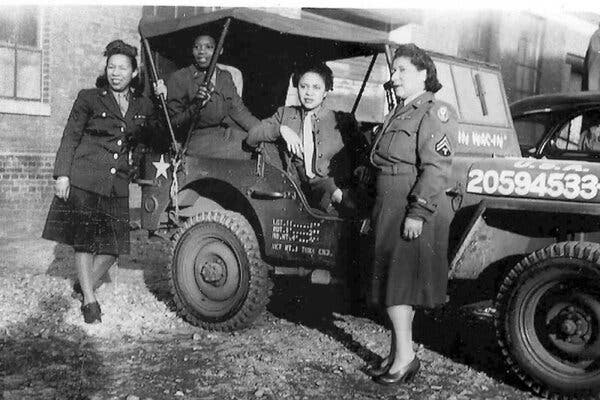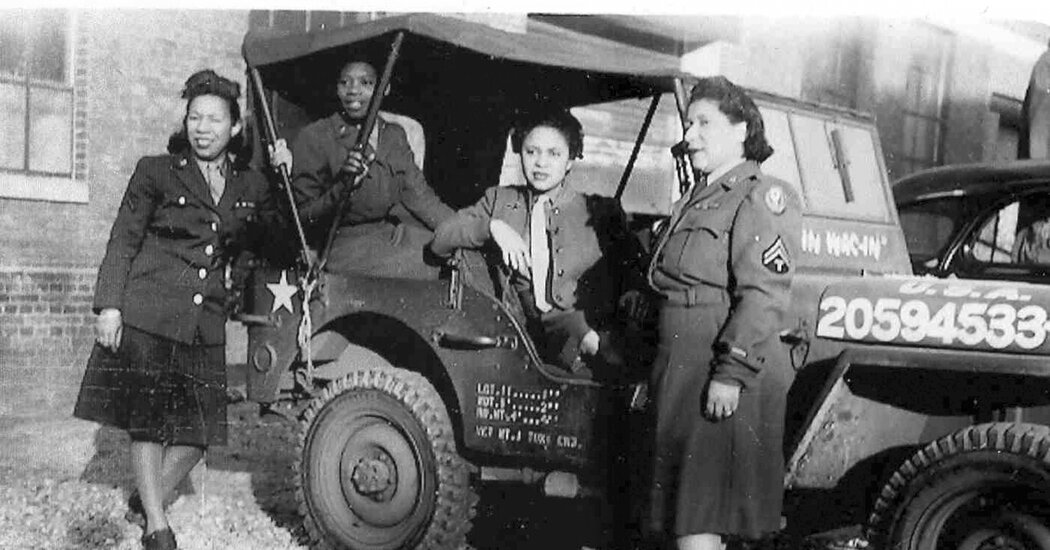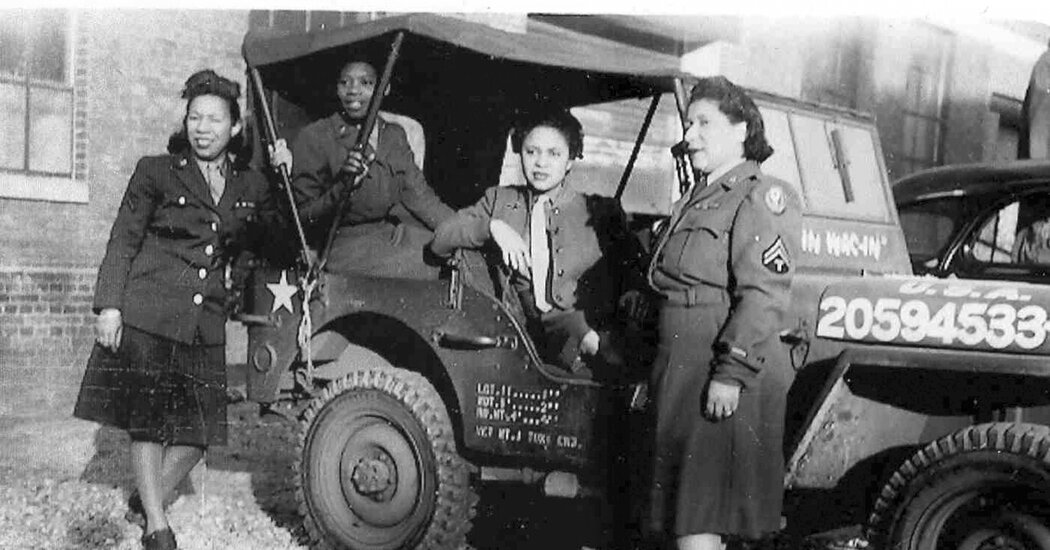The echoes of World War II still resonate, stories of courage, sacrifice, and resilience woven into the fabric of history. But some narratives remain untold, hidden in the shadows of time. Until now.

A Pivotal Moment: How their Success Challenged Racial and Gender Stereotypes

The Six Triple Eight, an all-Black, all-female Army battalion, played a pivotal role in challenging racial and gender stereotypes during World War II. Deployed to England in 1945, they were tasked with clearing a backlog of 17 million letters and packages, a mission that was considered critical to maintaining U.S. soldiers’ morale during the war.
The battalion’s success not only proved that Black women were capable of performing complex and challenging tasks but also shattered the myth that they were not suited for military service. The unit’s achievement sent a powerful message, demonstrating the potential of diverse groups to excel in high-pressure environments.
As historian Dr. Brenda E. Stevenson noted, “The Six Triple Eight’s accomplishment was a testament to the power of determination and hard work. They proved that Black women were not only capable but also essential to the war effort, and their contribution paved the way for future generations of women and minorities in the military.”
The battalion’s success also highlighted the importance of representation and diversity in the military. As the only all-Black, all-female unit to serve in Europe during World War II, they served as a beacon of hope for marginalized groups, demonstrating that they too could serve their country and make a meaningful contribution to the war effort.
In a statement commemorating the Six Triple Eight’s achievement, General Mark A. Milley, the Chairman of the Joint Chiefs of Staff, noted, “The Six Triple Eight’s legacy serves as a reminder of the importance of diversity and inclusion in our military. Their bravery, resilience, and dedication to their mission are an inspiration to us all, and their story serves as a powerful reminder of the progress we have made and the work that remains to be done.”
The Six Triple Eight’s success also had a lasting impact on the military’s approach to diversity and inclusion. In the years following the war, the military implemented policies aimed at increasing diversity and representation, including the establishment of the Women’s Army Corps (WAC) and the desegregation of the armed forces.
Today, the Six Triple Eight’s legacy continues to inspire military leaders and personnel alike, serving as a reminder of the importance of diversity, equity, and inclusion in the military.

A Groundbreaking Achievement
The Six Triple Eight’s achievement was groundbreaking in many ways. Deployed to a war zone with limited resources and infrastructure, they were tasked with clearing a massive backlog of mail, a feat that had never been attempted before.
The unit’s success was nothing short of remarkable, with the battalion processing up to 65,000 pieces of mail in each eight-hour shift, a rate that far exceeded expectations.
As Dr. Stevenson noted, “The Six Triple Eight’s achievement was a testament to the power of teamwork and collaboration. They worked tirelessly, often in difficult conditions, to ensure that the mail was processed and delivered to its intended recipients.”
- Clearing a backlog of 17 million letters and packages
- Processing up to 65,000 pieces of mail in each eight-hour shift
- Creating a card-based index of over seven million military serial numbers

A Legacy of Empowerment: The Unit’s Contribution to Future Generations
The Six Triple Eight’s legacy extends far beyond their remarkable achievement during World War II. Their contribution to the war effort and their role as trailblazers for future generations of women and minorities in the military have had a lasting impact on the military and society as a whole.
As historian Dr. Stevenson noted, “The Six Triple Eight’s legacy serves as a powerful reminder of the importance of diversity and inclusion in our military. They paved the way for future generations of women and minorities to serve their country and make a meaningful contribution to the war effort.”
The Six Triple Eight’s legacy has also inspired countless individuals to pursue careers in the military and beyond. Their story serves as a powerful reminder of the importance of perseverance, determination, and hard work, and their achievement continues to inspire military leaders and personnel alike.
Today, the Six Triple Eight’s legacy continues to be celebrated and honored through various initiatives and programs aimed at promoting diversity and inclusion in the military.
A Lasting Impact
The Six Triple Eight’s legacy has had a lasting impact on the military and society as a whole. Their contribution to the war effort and their role as trailblazers for future generations of women and minorities in the military have paved the way for greater diversity and representation in the military.
As General Milley noted, “The Six Triple Eight’s legacy serves as a reminder of the importance of diversity and inclusion in our military. Their bravery, resilience, and dedication to their mission are an inspiration to us all, and their story serves as a powerful reminder of the progress we have made and the work that remains to be done.”
- Paving the way for future generations of women and minorities in the military
- Inspiring countless individuals to pursue careers in the military and beyond
- Continuing to inspire military leaders and personnel alike
The Fight Continues: Examining the Ongoing Struggle for Equality in the Military
Despite the progress made since the Six Triple Eight’s deployment during World War II, the struggle for equality in the military continues. Women and minorities still face significant barriers to advancement and equal opportunities in the military, and the fight for greater diversity and representation remains a pressing issue.
As historian Dr. Stevenson noted, “The Six Triple Eight’s legacy serves as a reminder of the ongoing struggle for equality in the military. Their achievement was a testament to the power of determination and hard work, but it also highlights the challenges that women and minorities still face in the military today.”
The military has made significant strides in recent years to promote diversity and inclusion, including the establishment of the Defense Advisory Committee on Women in the Services (DACOWITS) and the creation of the Office of Diversity and Inclusion.
However, despite these efforts, women and minorities continue to face significant barriers to advancement and equal opportunities in the military. The military must continue to address these disparities and work towards a more inclusive and equitable environment for all service members.
As General Milley noted, “The Six Triple Eight’s legacy serves as a reminder of the importance of diversity and inclusion in our military. Their bravery, resilience, and dedication to their mission are an inspiration to us all, and their story serves as a powerful reminder of the progress we have made and the work that remains to be done.”
A Continuing Challenge
The fight for equality in the military continues to be a pressing issue, with women and minorities still facing significant barriers to advancement and equal opportunities.
As Dr. Stevenson noted, “The Six Triple Eight’s legacy serves as a reminder of the ongoing struggle for equality in the military. Their achievement was a testament to the power of determination and hard work, but it also highlights the challenges that women and minorities still face in the military today.”
- Women and minorities continue to face significant barriers to advancement and equal opportunities
- The military must continue to address disparities and work towards a more inclusive and equitable environment
- The fight for equality in the military remains a pressing issue
Honoring the Past, Shaping the Future: The Significance of the Congressional Gold Medal
The Congressional Gold Medal is the highest civilian honor awarded by Congress, and it is a testament to the Six Triple Eight’s remarkable achievement and their enduring legacy.
The medal was awarded to the Six Triple Eight in recognition of their service and sacrifice during World War II, and it serves as a powerful reminder of the importance of diversity and inclusion in the military.
As General Milley noted, “The Six Triple Eight’s legacy serves as a reminder of the importance of diversity and inclusion in our military. Their bravery, resilience, and dedication to their mission are an inspiration to us all, and their story serves as a powerful reminder of the progress we have made and the work that remains to be done.”
The Congressional Gold Medal is a symbol of the Six Triple Eight’s achievement and their enduring legacy, and it serves as a reminder of the importance of diversity and inclusion in the military.
A Long Overdue Recognition
The Congressional Gold Medal is a long overdue recognition of the Six Triple Eight’s remarkable achievement and their enduring legacy.
As Dr. Stevenson noted, “The Six Triple Eight’s legacy serves as a reminder of the importance of diversity and inclusion in our military. Their achievement was a testament to the power of determination and hard work, and it is a testament to the progress we have made and the work that remains to be done.”
- The Congressional Gold Medal is the highest civilian honor awarded by Congress
- The medal was awarded to the Six Triple Eight in recognition of their service and sacrifice during World War II
- The medal serves as a powerful reminder of the importance of diversity and inclusion in the military
A Message of Hope and Progress
The Congressional Gold Medal is a message of hope and progress, serving as a reminder of the importance of diversity and inclusion in the military.
As General Milley noted, “The Six Triple Eight’s legacy serves as a reminder of the importance of diversity and inclusion in our military. Their bravery, resilience, and dedication to their mission are an inspiration to us all, and their story serves as a powerful reminder of the progress we have made and the work that remains to be done.”
The medal also serves as a reminder of the ongoing struggle for equality in the military and the importance of continued efforts to promote diversity and inclusion.
As Dr. Stevenson noted, “The Six Triple Eight’s legacy serves as a reminder of the ongoing struggle for equality in the military. Their achievement was a testament to the power of determination and hard work, but it also highlights the challenges that women and minorities still face in the military today.”
A Symbol of Progress
The Congressional Gold Medal is a symbol of progress, serving as a reminder of the importance of diversity and inclusion in the military.
As General Milley noted, “The Six Triple Eight’s legacy serves as a reminder of the importance of diversity and inclusion in our military. Their bravery, resilience, and dedication to their mission are an inspiration to us all, and their story serves as a powerful reminder of the progress we have made and the work that remains to be done.”
- The Congressional Gold Medal is a message of hope and progress
- The medal serves as a reminder of the importance of diversity and inclusion in the military
- The medal also serves as a reminder of the ongoing struggle for equality in the military
Continuing the Conversation
The Congressional Gold Medal serves as a reminder of the ongoing conversation about diversity and inclusion in the military.
As General Milley noted, “The Six Triple Eight’s legacy serves as a reminder of the importance of diversity and inclusion in our military. Their bravery, resilience, and dedication to their mission are an inspiration to us all, and their story serves as a powerful reminder of the progress we have made and the work that remains to be done.”
The medal also serves as a reminder of the importance of continued efforts to promote diversity and inclusion in the military.
As Dr. Stevenson noted, “The Six Triple Eight’s legacy serves as a reminder of the ongoing struggle for equality in the military. Their achievement was a testament to the power of determination and hard work, but it also highlights the challenges that women and minorities still face in the military today.”
A Continuing Effort
The Congressional Gold Medal serves as a reminder of the ongoing effort to promote diversity and inclusion in the military.
As General Milley noted, “The Six Triple Eight’s legacy serves as a reminder of the importance of diversity and inclusion in our military. Their bravery, resilience, and dedication to their mission are an inspiration to us all, and their story serves as a powerful reminder of the progress we have made and the work that remains to be done.”
- The Congressional Gold Medal serves as a reminder of the ongoing conversation about diversity and inclusion in the military
- The medal serves as a reminder of the importance of continued efforts to promote diversity and inclusion
- The medal also serves as a reminder of the ongoing struggle for equality in the military
Conclusion
Honoring the Unsung Heroes: The Lasting Legacy of the Six Triple Eight
The article “The Six Triple Eight: Black, Female Soldiers Honored for World War II Success – The New York Times” sheds light on a pivotal moment in history that has long been overlooked. The Six Triple Eight, an all-black, female unit that played a crucial role in the war effort, is finally receiving the recognition it deserves. The unit’s remarkable achievements, from serving in the Army’s 6888th Central Postal Directory Battalion to facilitating communication between troops and their families, demonstrate the resilience, determination, and bravery of these unsung heroes. The article highlights the unit’s remarkable statistics, including processing over 250,000 pounds of mail in just 11 weeks, a feat that helped maintain morale and sustain the troops.
The significance of the Six Triple Eight’s story extends far beyond the wartime era. It serves as a powerful reminder of the often-ignored contributions of African American women in the military and the broader struggle for equality and justice. Their bravery and perseverance in the face of racism and sexism pave the way for future generations of women and minorities to break barriers and shatter glass ceilings. The article’s focus on the Six Triple Eight also underscores the importance of acknowledging and honoring the sacrifices of those who have served, ensuring that their stories are not lost to history.
As we reflect on the Six Triple Eight’s legacy, we are reminded that their story is not just a relic of the past, but a testament to the power of courage, determination, and collective action. As we move forward, it is essential that we continue to amplify the voices and stories of marginalized communities, ensuring that their contributions are recognized and valued. By doing so, we honor not only the past but also the present and future, where the next generation of leaders and change-makers will draw inspiration from the unwavering spirit of the Six Triple Eight.
